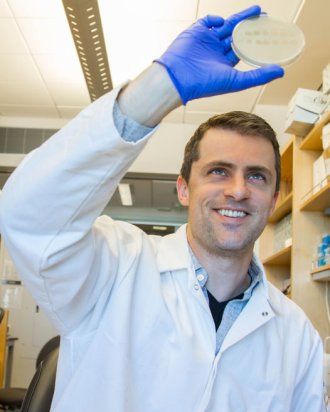Scientist Wins Prestigious Bowes Biomedical Investigator Award for Finding ‘Anti-CRISPRs’
Bondy-Denomy Says Protein Acts as “Rock” to CRISPR’s “Scissors”

Microbiologist Joseph Bondy-Denomy, PhD, has been selected as the 2022 William K. Bowes Jr. Biomedical Investigator for his groundbreaking discovery of a secret weapon deployed by viruses in their ancient battle against bacteria.
Armed with its naturally formidable immune system known as CRISPR, certain bacteria almost always win the struggle against the viruses that infect them, called bacteriophages – “phages” for short. But in 2011, while still a doctoral student at the University of Toronto, Bondy-Denomy made a surprising discovery.
Long fascinated by the evolutionary arms race between the microbes, he was studying how the common bacterium Pseudomonas aeruginosa uses CRISPR to fight invading phages when he found that a smattering of phages managed to kill the bacteria by producing proteins that blunted CRISPR’s “scissors.”
At first, he was certain he had made a mistake.
“How did these phages succeed despite the fact that P. aeruginosa has this amazing CRISPR system – the scissors it uses to cut phages to shreds? Why are the phages not dying?” he asked. “The answer was, they were throwing a rock – these anti-CRISPR proteins that we discovered – at the CRISPR scissors. So, we call them the anti-CRISPRs.”
Bondy-Denomy believes that the phages’ ability to survive CRISPR’s lethal scissors and actually kill P. aeruginosa provides hope in the fight against the virulent bacteria, which are resistant to antibiotics, often fatal, and one of the most common causes of hospital-acquired infections.
Since arriving at UC San Francisco as a Sandler Fellow in 2015, Bondy-Denomy and his team have focused on further understanding how bacteriophages disarm bacteria’s mighty CRISPR immune system. They hope to harness that know-how into drugs to cure antibiotic-resistant infections, which kill 35,000 Americans and sicken 2.8 million every year.
Bondy-Denomy, who began his research in the University of Toronto lab of Alan Davidson, PhD, is confident that CRISPR has not revealed all of its secrets. He acknowledges that many believe scientists understand all there is to know about CRISPR, short for “clustered regularly interspaced short palindromic repeat,” but he is convinced otherwise. He noted that the CRISPR-Cas9 genome-editing tool was developed by scientists probing the inner workings of bacteria and viruses – a breakthrough that earned UC Berkeley’s Jennifer Doudna, PhD, and Emmanuelle Charpentier, PhD, of the Max Planck Institute for Infection Biology in Berlin, the 2020 Nobel Prize in Chemistry.
Joe’s remarkable discovery that bacteriophages have evolved an anti-immune system to counter the CRISPR system in bacteria represents a fundamental advancement in our knowledge of the origins of immunology in the earliest-known organisms.
“Phage therapy is coming into its own. The question is, will it be the next penicillin, or will it be a little more niche?” Bondy-Denomy asked. “We will find new things at the point where bacteria and phages meet because they’ve been battling for a couple of billion years. There’s innovation we can’t imagine yet, and there are tools we also can’t imagine.”
To further his research, Bondy-Denomy, who was named an assistant professor in the UCSF Department of Microbiology and Immunology in 2017, will receive $1.25 million over five years from the $50 million endowment created by the late Bill Bowes, a longtime UCSF supporter and Distinguished Director of the UCSF Foundation Board of Directors. The Bowes Biomedical Investigator Program was established in 2016 to support basic scientists whose work is all too often overlooked by the National Institutes of Health. Bowes, a venture capitalist, believed in supporting early- and mid-career scientists who may be unconventional in their approach to science and whose research needs funding support.
Lewis Lanier, PhD, chair of the Department of Microbiology and Immunology, nominated Bondy-Denomy for the award and was delighted that he won. “Joe’s remarkable discovery that bacteriophages have evolved an anti-immune system to counter the CRISPR system in bacteria represents a fundamental advancement in our knowledge of the origins of immunology in the earliest-known organisms,” Lanier said. “His research promises to provide opportunities in the development of new antimicrobial therapies.”
Danica Fujimori, PhD, one of Bondy-Denomy’s mentors, who won the Bowes award in 2020, agreed. “In addition to Joe’s work to fundamentally understand how the CRISPR-Cas function is regulated by anti-CRISPR proteins, his research is at the forefront of new treatments for difficult-to-treat, antibiotic-resistant infections,” she said.
James Fraser, PhD, also a Bowes award winner, said about his fellow Canadian: “Joe has a nose for uncovering fascinating new biology. He follows the phage, and it pays off.”
Lanier also spoke to the significant financial boost provided by the five-year funding stream, especially for junior faculty members. “Having discretionary funding allows a scientist to launch new projects, compared to the usual grant systems where the work must be half-done before it’s funded,” he said. “This award supports innovative ideas and really advances the field.”
Describing himself as “floored” upon hearing the news that he won the highly coveted award, Bondy-Denomy says the support – financial and otherwise – tells him he came to the right place when he joined UCSF.
“The interconnectedness of basic sciences, and strong backing like this is what I’m grateful for. I especially appreciate not only what the money means to our lab but also what it says about the 14 people on my team,” he said.
“It tells me to keep pushing the frontier of microbes because who knows what we will find. It is so empowering. The magnitude of the award says, ‘Keep it up.’”